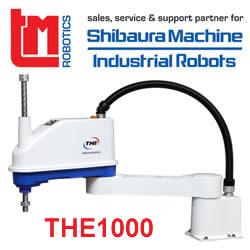ABB – First Global Industrial Robotics Company to Manufacture Robots in the United States
Start of local robot manufacturing cements ABBs commitment to North American customers.
Zurich, Switzerland - ABB, the global leader in power and automation technologies, announced today that it is to start producing robots in the United States, making it the first global industrial robotics company to fully commit and invest in a North American robotics manufacturing footprint. The company made the announcement at the opening of a new robotics plant at its facility in Auburn Hills, Michigan. Production is to commence immediately.
The new plant is ABBs third robotics production facility, alongside Shanghai, China, and Västerås, Sweden, and will manufacture ABB robots and related equipment for the North American market.
The United States is ABBs largest market with US$7.5 billion in sales. The company has invested more than US$10 billion in local R&D, capital expenditure and acquisitions since 2010, taking local employment from 11,500 to 26,300. Continued investment in the North American value chain and manufacturing constitutes a significant part of ABBs global growth plans reflecting the companys Next Level strategy.
"Today, we are marking and celebrating the next stage of our commitment and growth in North America with the start of local robot manufacturing in Auburn Hills, US," said ABB CEO Ulrich Spiesshofer. "ABB is the first global automation company to open a robot manufacturing facility in the United States. Robotics is a fundamental enabler of the next level of North American industrial growth in an increasingly competitive world. With our continued commitment and investment, our local team is well positioned to support our customers with robotics solutions made in the United States. Our leading technology of web-enabled, collaborative and safe robots will contribute to job security and quality of work."
"The new North American manufacturing presence elevates our offering and service to robotics customers in the United States, Mexico and Canada, allowing us to achieve best-in-class delivery schedules and technical support in North America," said Per Vegard Nerseth, Managing Director of ABB Robotics. "The expansion is consistent with our global strategy, which is to establish a local presence in key robotics growth markets to provide our leading technology to our customers."
The portfolio of products manufactured at the new facility will expand in phases, with the goal that most ABB robots and robot controllers delivered in the United States, Canada and Mexico will be manufactured in Auburn Hills. Localized manufacturing streamlines the delivery process and results in significantly reduced robot lead times for customers.
About ABB
ABB is a leader in power and automation technologies that enable utility, industry, and transport and infrastructure customers to improve their performance while lowering environmental impact. The ABB Group of companies operates in roughly 100 countries and employs about 140,000 people.
About ABB Robotics
ABBs Robotics Business Unit (www.abb.com/robotics) is a leading supplier of industrial robots - also providing robot software, peripheral equipment, modular manufacturing cells and service for tasks such as welding, handling, assembly, painting and finishing, picking, packing, palletizing and machine tending. Key markets include automotive, plastics, metal fabrication, foundry, electronics, machine tools, pharmaceutical and food and beverage industries. A strong solutions focus helps manufacturers improve productivity, product quality and worker safety. ABB has installed more than 250,000 robots worldwide.
Featured Product

TM Robotics - Shibaura Machine THE SCARA range
The THE range from Shibaura Machine is an extensive line up of SCARA robots. Available in four arm lengths THE400 (400mm), THE600 (600mm) and the most recent THE800 (800mm) and THE1000 (1000mm), this range is suitable for assembly, handling, inspection and pick and place processes in varied industrial applications. The THE1000 boasts a 20kg payload capacity and an impressive 0.44 second cycle time, providing high speeds for processes with large components. In fact, the range has been recognised for as the price-to-performance leader compared to other SCARA models in its price range due to its impressive speed versus payload capacity.
